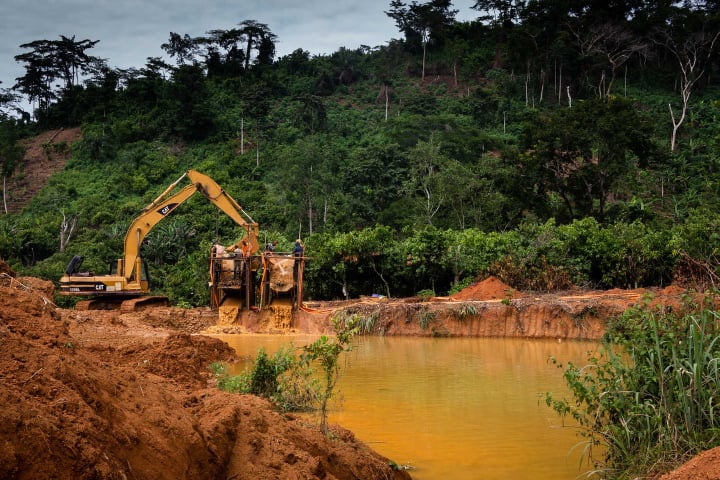The Ghana National Association of Rock Miners (GNARoM) has voiced its strong opposition to the government’s proposed ban on issuing prospecting licenses for small-scale mining. The association argues that this measure would not only create chaos within the mining sector but also fail to address the root causes of illegal mining, locally known as “galamsey.” Instead of halting the issuance of licenses, GNARoM urges the government to streamline the bureaucratic processes involved in acquiring them, which they believe contribute significantly to the proliferation of illegal mining activities. They contend that the real issue is not the issuance of licenses but rather the manipulation of the system by influential figures who bypass regulations for personal gain.
GNARoM President, Dr. Twum Barimah, highlighted the historical context of small-scale mining regulations, recalling a time when chaotic mining practices led to injuries and fatalities. The introduction of the small-scale mining law, he explains, brought a degree of order and allowed for the formation of associations like GNARoM. However, the current surge in illegal mining, according to Dr. Barimah, stems from the depletion of designated small-scale mining lands and the subsequent manipulation of regulations by some government officials. He believes that these individuals exploit loopholes in the system to control mining activities, effectively hijacking the sector and driving miners towards illegality. A ban on prospecting licenses, he argues, will only exacerbate this problem by further limiting legitimate avenues for small-scale miners.
The association emphasizes that the lengthy delays in obtaining licenses are a major contributing factor to illegal mining. Prospective miners, faced with protracted bureaucratic processes, often resort to illegal operations out of desperation. This delay, GNARoM argues, creates a breeding ground for “galamsey” as individuals seeking to make a living are forced to operate outside the legal framework. Therefore, rather than restricting licenses, the government should focus on expediting the application process and making it more transparent and accessible. This would not only curb illegal mining but also empower legitimate small-scale miners to contribute to the economy within the bounds of the law.
GNARoM further underscores its commitment to responsible and sustainable mining practices. According to the association, the vast majority of its members conduct underground mining operations, which significantly minimizes environmental damage compared to surface mining often practiced by illegal miners. This commitment to environmental responsibility further strengthens their argument against a blanket ban on prospecting licenses, as it penalizes legitimate operators striving to adhere to sustainable practices. They believe a more effective approach would be to collaborate with the government to enforce regulations and ensure compliance among all stakeholders in the mining sector.
The association has expressed strong support for the newly established Goldbod, an entity tasked with regulating the gold industry, stabilizing the national currency, and maximizing revenue from gold exports. GNARoM views Goldbod as a potential “game-changer” for the Ghanaian economy and has pledged its full cooperation to help achieve its objectives. They see the establishment of Goldbod as a positive step towards formalizing the gold sector and believe their collaboration with the entity will further enhance their commitment to responsible mining practices. They anticipate that this partnership will contribute to economic growth and development while ensuring the sustainability of the mining sector.
GNARoM’s legal advisor, Mr. Eric Offei, reinforced the association’s commitment to operating within the legal framework. He emphasized that mining operations must adhere to established laws and regulations, stressing the importance of responsible and sustainable practices. This commitment to legality further supports their plea for a reconsideration of the proposed ban on prospecting licenses. By focusing on legal compliance and responsible operations, GNARoM aims to contribute positively to the Ghanaian economy while minimizing the environmental impact of their activities. They advocate for a collaborative approach between miners, the government, and regulatory bodies to ensure the long-term sustainability of the mining sector.














